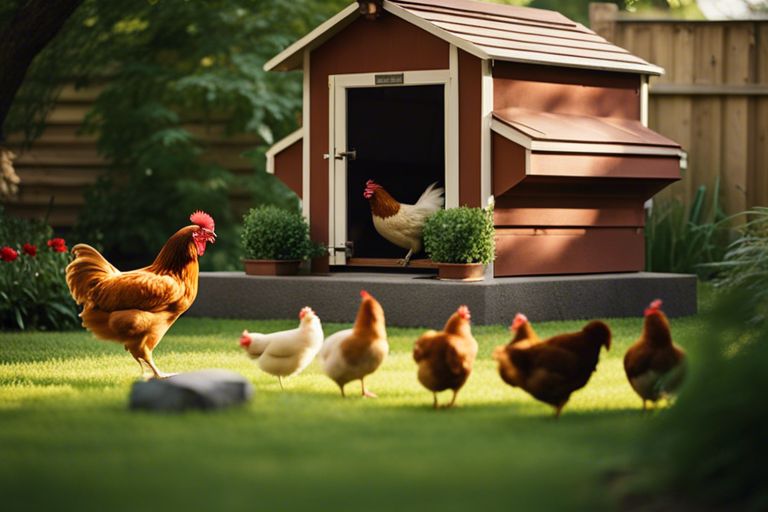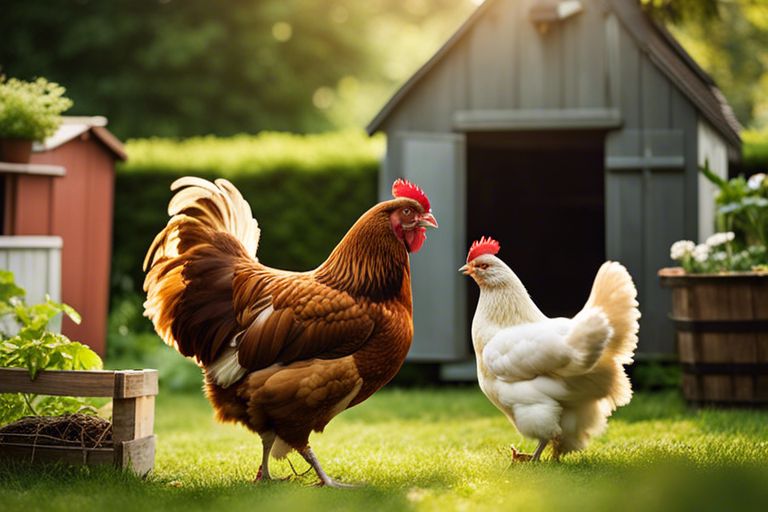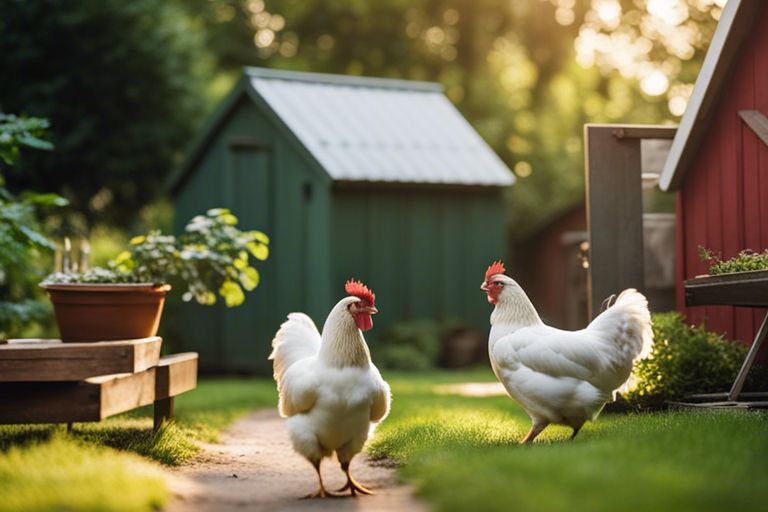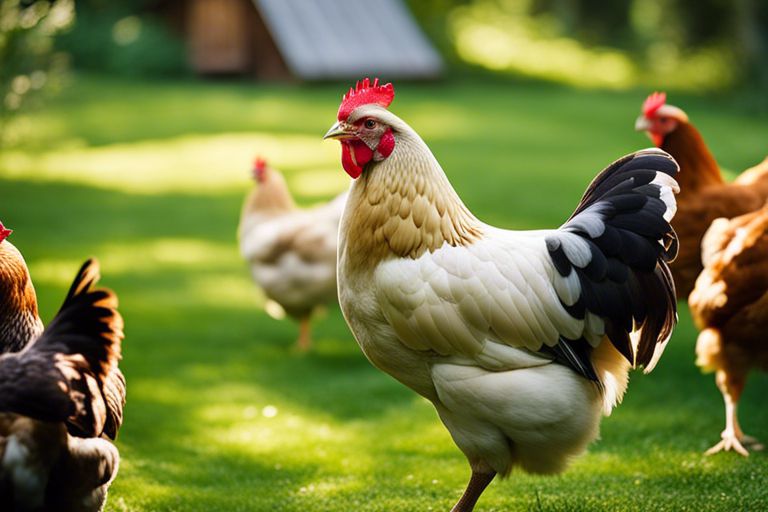Guide to raising healthy chickens is important for any aspiring poultry farmer. Raising chickens can be a rewarding and fulfilling experience, but it requires proper knowledge and care to ensure the overall health and well-being of your feathered friends. In this comprehensive guide, we will cover everything from choosing the right breed and setting up a coop, to providing proper nutrition and healthcare for your chickens. Whether you’re a beginner or an experienced chicken keeper, this ultimate guide will provide you with all the information you need to raise happy and healthy chickens.

Choosing the Right Chickens for Your Flock
Understanding Different Chicken Types
If you’re considering raising chickens, it’s crucial to understand the different types of chickens available. Knowing the characteristics, egg-laying capabilities, and temperament of each type will help you select the best fit for your flock.
| Chicken Type | Characteristics |
| Layers | Good egg producers |
| Broilers | Raised for meat production |
| Dual-purpose | Provide both eggs and meat |
| Bantams | Small-sized chickens |
| Rare Breeds | Unique and heritage breeds |
Knowing the differences between these types will allow you to make an informed decision based on your specific needs and goals.
Factors to Consider Before Selecting Your Chickens
If you’re ready to select your chickens, there are several factors to consider before making a decision. Any prospective chicken owner should think about the space available, climate, and local ordinances regarding raising backyard chickens. It’s crucial to choose chickens that will thrive in your particular environment.
- Space requirements
- Climate suitability
- Local regulations
- Personal preferences
One should also consider the purpose of raising chickens. Whether it’s for eggs, meat, or both, understanding your goals will help you choose the right breeds. Any decision should be based on thorough research and consideration of all these factors to ensure a successful chicken-raising experience.

Essential Tips for a Healthy Flock
While raising chickens can be a rewarding experience, ensuring the health and well-being of your flock is crucial. By following some vital tips, you can create an environment that promotes their overall health and happiness.
Creating Optimal Living Conditions
There’s nothing more important than providing your chickens with a clean and spacious living environment. Make sure their coop is well-ventilated, free of drafts, and offers protection from predators. Maintaining good hygiene by regularly cleaning their coop and nesting boxes will help prevent the spread of diseases.
Nutrition and Feeding
Creating a balanced diet for your chickens is vital for their health and productivity. Ensure they have access to fresh water at all times and provide them with a high-quality feed that is specifically formulated for their age and stage of life. Supplementing their diet with fruits, vegetables, and occasional treats can also help keep them happy and healthy.
Essential minerals such as calcium and grit should always be available to help with egg production and digestion. Monitor their food intake to prevent overeating or malnutrition, as both can have detrimental effects on their health.
Perceiving and addressing any signs of illness or distress in your flock promptly is key to maintaining their health and preventing the spread of any potential diseases. By following these vital tips, you can ensure that your chickens lead a long, healthy, and happy life.

Step-by-Step Care Maintenance
Many new chicken owners find themselves overwhelmed with the responsibility of caring for their feathered friends. To simplify the process, here is a breakdown of the key maintenance steps needed to raise healthy chickens:
| Routine Health Checks and Preventive Care | Breeding and Managing the Brooding Process |
Routine Health Checks and Preventive Care
Assuming the role of a diligent caregiver, it is crucial to conduct routine health checks on your chickens to catch any potential issues early on. Regularly inspect their eyes, feathers, feet, and overall condition to ensure they are in good health. Additionally, provide preventive care such as vaccinations and deworming to safeguard your flock against common illnesses.
Breeding and Managing the Brooding Process
Breeding chickens can be a rewarding experience, but it requires careful planning and management. When breeding, select healthy and genetically diverse breeding stock to maintain strong and robust offspring. Managing the brooding process involves providing a suitable environment for the hen to incubate the eggs and ensuring the chicks receive proper nutrition and warmth during their early days of life.
Illness
Chickens are susceptible to various illnesses, including respiratory infections, parasitic infestations, and nutritional deficiencies. It is necessary to monitor your flock regularly for any signs of illness, such as lethargy, abnormal droppings, or decreased egg production. In case of illness, promptly isolate the affected chickens, consult with a veterinarian, and follow their treatment recommendations to prevent the spread of disease within the flock.
Pros and Cons of Raising Chickens
| Pros | Cons |
| Fresh eggs daily | Time-consuming |
| Organic pest control | Initial setup costs |
| Quality fertilizer for your garden | Space requirements |
| Teaches responsibility to children | Can attract predators |
| Builds a connection with nature | Health and hygiene concerns |
The Rewards of Poultry Ownership
Raising chickens not only provides you with a constant supply of fresh eggs but also offers the satisfaction of knowing where your food comes from. Additionally, interacting with chickens can be therapeutic and educational for both children and adults.
Challenges and Considerations
Considerations regarding raising chickens include the time and effort required to care for them properly, as well as the initial investment in a coop and supplies. Additionally, you must safeguard your chickens from predators and maintain their health and hygiene to ensure their well-being.
A key consideration when raising chickens is to provide adequate space for them to roam and exercise. Chickens also require consistent access to fresh water, a balanced diet, and protection from extreme weather conditions. Regular health check-ups and vaccinations can help prevent disease outbreaks within your flock.
Summing up
So, in conclusion, “The Ultimate Guide To Raising Healthy Chickens” provides comprehensive and vital information for anyone looking to start their own backyard flock. From setting up the coop to preventing common diseases, this guide covers all the key aspects of raising healthy chickens. By following the tips and advice outlined in this guide, you can ensure that your chickens are happy, healthy, and thriving. Note, a well-cared-for chicken will reward you with fresh eggs, companionship, and endless entertainment. Happy chicken raising!
FAQ
Q: Why is raising healthy chickens important?
A: Raising healthy chickens is important to ensure optimal egg production, quality meat, and overall well-being of the birds.
Q: What are the key elements to consider when raising healthy chickens?
A: The key elements to consider when raising healthy chickens include proper nutrition, clean water, adequate shelter, and regular health checks.
Q: How can I provide proper nutrition to my chickens?
A: Proper nutrition for chickens includes a balanced feed that contains imperative nutrients such as protein, carbohydrates, vitamins, and minerals. You can also supplement their diet with kitchen scraps and greens.
Q: What should I look for in a chicken coop?
A: A good chicken coop should provide enough space for your chickens to move around comfortably, protection from predators, proper ventilation, and easy access for cleaning.
Q: How can I prevent common health issues in chickens?
A: To prevent common health issues in chickens, make sure to keep their living area clean, provide access to fresh water at all times, and monitor them for any signs of illness such as lethargy or decreased egg production.
Q: How often should I clean the chicken coop?
A: The chicken coop should be cleaned regularly, ideally at least once a week. Remove soiled bedding, droppings, and any uneaten food to prevent the buildup of bacteria and pests.
Q: What are some signs that indicate a chicken is unhealthy?
A: Signs that indicate a chicken is unhealthy include lethargy, droopy wings, discharge from the eyes or nostrils, abnormal droppings, or a decrease in egg production. It’s important to address these issues promptly to prevent further health complications.











